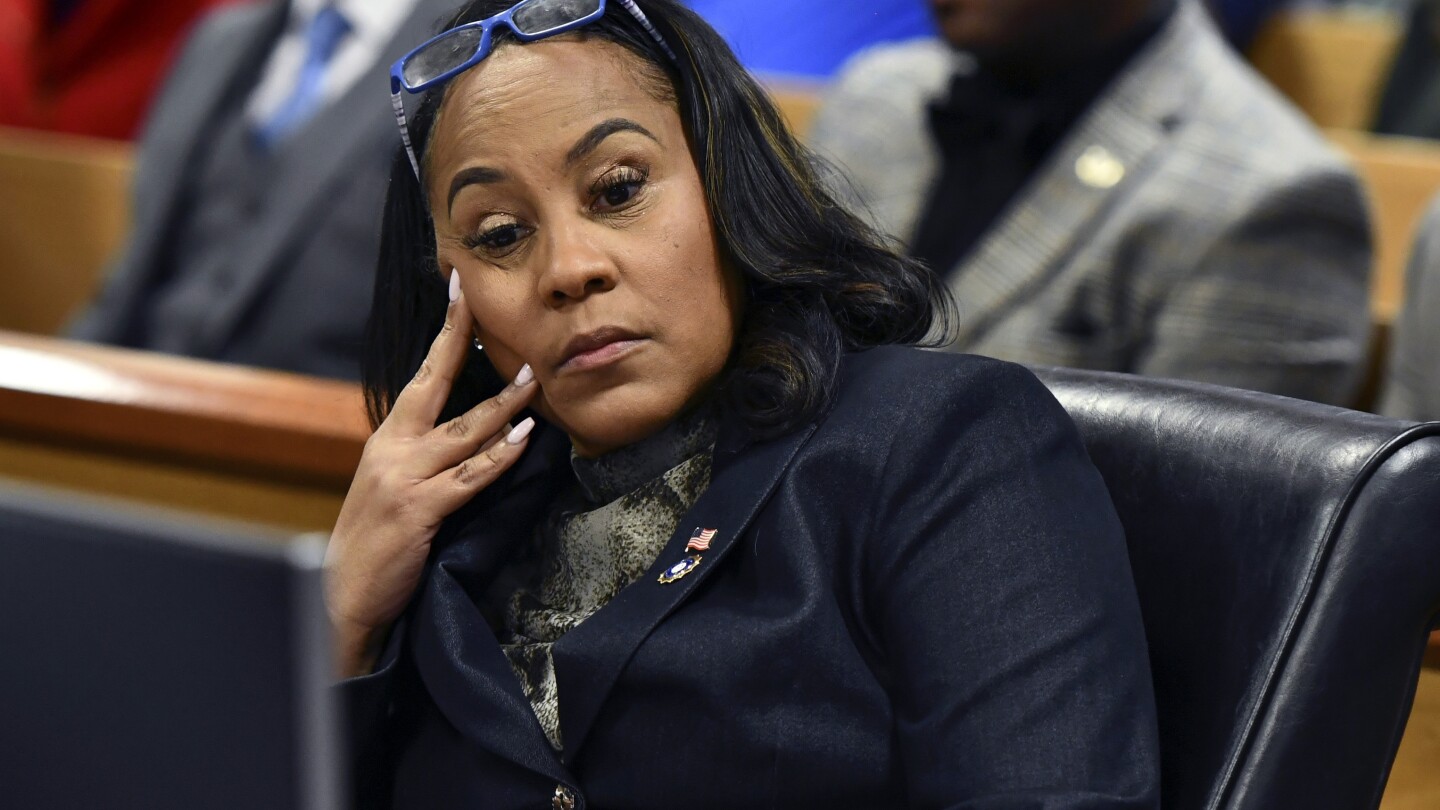ATLANTA (AP) — A Georgia judge who is deciding whether to toss Fulton County District Attorney Fani Willis off of the state’s election interference case against former President Donald Trump has set a hearing for Thursday that is expected to focus on details of Willis’ personal relationship with a special prosecutor she hired.
As soon as allegations of an inappropriate romantic relationship between Willis and attorney Nathan Wade surfaced last month, speculation about the future of the case began to swirl. Even if the prosecution isn’t derailed, the upheaval has certainly created an unwanted distraction for Willis and her team and could undermine public confidence in the case.
The defense attorney who first exposed the relationship says it creates a conflict of interest and is asking the judge to dismiss the indictment and to prohibit Willis, Wade and their offices from further involvement in the case. In a response filed earlier this month, Willis acknowledged a “personal relationship” but said it has no bearing on the serious criminal charges she’s pursuing and asked the judge to dismiss the motions seeking her disqualification without a hearing.
The law says “disqualification can occur if evidence is produced demonstrating an actual conflict or the appearance of one,” Fulton County Superior Court Judge Scott McAfee said during a hearing Monday. Because he believes “it’s possible that the facts alleged by the defendant could result in a disqualification, I think an evidentiary hearing must occur to establish the record on those core allegations.”
The highly anticipated hearing, like all courtroom proceedings in the case, will be streamed live on the judge’s YouTube channel, as well as by news outlets. McAfee has said it could continue into Friday.
As he makes another run for the White House and faces three other criminal prosecutions, the former president has exploited the revelation of the relationship, repeatedly referring to Wade as Willis’ “lover” or “boyfriend” to try to cast doubt on Willis’ motivations and the legitimacy of the case. Other Republicans have piled on, using the claims to justify calls for investigations into or sanctions against Willis, an elected Democrat who’s up for reelection this year.
The original motion was filed by former Trump campaign staffer and onetime White House aide Michael Roman, but Trump and several other co-defendants have joined with motions of their own.
Roman’s motion says Willis and Wade were romantically involved when she hired him in November 2021 to manage an investigation into whether Trump and others committed any crimes as they tried to overturn his 2020 election loss in Georgia. That investigation led to the indictment in August of Trump and 18 others who are accused of participating in a sprawling illegal scheme to keep Trump in office.
Four of the people charged have already pleaded guilty after reaching deals with prosecutors. Trump and the remaining 14 have all pleaded not guilty.
Willis has paid Wade more than $650,000 for his work and then, Roman alleges, profited personally when Wade used that money to take her on expensive vacations, including cruises in the Bahamas and trips to Aruba, Belize and Napa Valley. His filing also questions Wade’s qualifications for the job, saying there’s no evidence he had ever prosecuted a felony or handled a racketeering case.
Just under a week after Roman’s motion was filed, Willis used a speech at a historic Black church in Atlanta to forcefully defend Wade’s qualifications and her own decision to hire him. She didn’t address the allegations of a relationship in that speech, waiting nearly three more weeks to acknowledge a “personal relationship” in a court filing.
Attached to that filing was a sworn statement from Wade saying that the pair began a personal relationship in 2022, after he was hired as a special prosecutor. His statement also said travel expenses for him and Willis were “roughly divided equally between us” and that Willis “received no funds or personal financial gain” from his position as a special prosecutor.
McAfee said Thursday’s hearing needs to explore “whether a relationship existed, whether that relationship was romantic or non-romantic in nature, when it formed and whether it continues.” Those questions are only relevant, he said, “in combination with the question of the existence and extent of any personal benefit conveyed as a result of the relationship.”
Roman’s attorney, Ashleigh Merchant, has subpoenaed Willis, Wade, seven other employees of the district attorney’s office and others, including Wade’s former business partner, Terrence Bradley. Merchant told McAfee on Monday that Bradley would testify that Willis and Wade’s romantic relationship began before Wade was hired as special counsel and that they had stayed together in homes where the county was paying for Willis to stay.
Willis sought to quash those subpoenas. She argued Roman’s attempts to subpoena people in her office “suggests an eye toward public narrative as opposed to legal remedy” and that anything Bradley knows is protected by attorney-client privilege as he once served as Wade’s divorce attorney. McAfee declined on Monday to quash those subpoenas, but agreed to revisit that after Bradley testifies.
Aware of the personal nature of some of the details that could arise in Thursday’s hearing, the judge said that if there’s anything that amounts to “harassment or undue embarrassment,” he is “not going to feel inhibited from stepping in, even without an objection from counsel, to move this along and keep it focused on the issues at hand.”
McAfee also made clear that he does not believe arguments over Wade’s qualifications are relevant, saying that as long as an attorney “has a heartbeat and a bar card,” it is within the district attorney’s discretion to hire him.

